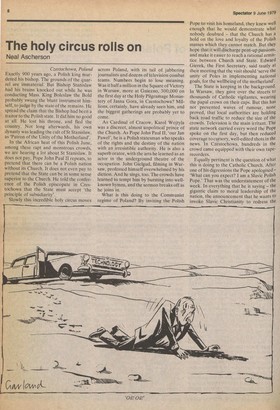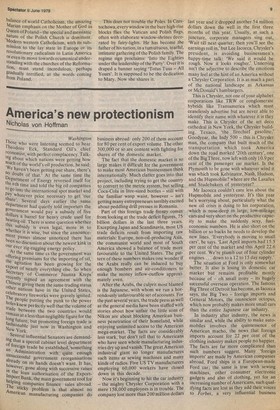The holy circus rolls on
Neal Ascherson
Czestochowa, Poland Exactly 900 years ago, a Polish king murdered his bishop. The grounds of the quarrel are immaterial. But Bishop Stanislaw had his brains knocked out while he was conducting Mass. King Boleslaw the Bold probably swung the blunt instrument himself, to judge by the state of the remains. He spread the claim that the Bishop had been a traitor to the Polish state. It did him no good at all. He lost his throne, and fled the country. Not long afterwards, his own dynasty was leading the cult of St Stanislaw, as 'Patron of the Unity of the Motherland'.
In the African heat of this Polish June, among these rapt and monstrous crowds, we are hearing a lot about St Stanislaw. It does not pay, Pope John Paul II repeats, to pretend that there can be a Polish nation without its Church. It does not even pay to pretend that the State can be in some sense superior to the Church. He told the conference of the Polish episcopate in Czestochowa that the State must accept 'the principle of subsidiarity'.
Slowly this incredible holy circus moves across Poland, with its tail of jabbering journalists and dozens of television combat teams. Numbers begin to lose meaning. Was it half a million in the Square of Victory in Warsaw, more at Gniezno, 300,000 on the first day at the Holy Pilgramage Monastery of Jasna Gora, in Czestochowa? Millions, certainly, have already seen him, and the biggest gatherings are probably yet to come.
As Cardinal of Cracow, Karol Wojtyla was a discreet, almost unpolitical prince of the Church. As Pope John Paul II, 'our Jan Pawel', he is a Polish statesman who speaks of the rights and the destiny of the nation with an irresistible authority. He is also a superb orator, with the arts he learned as an actor in the underground theatre of the occupation. John Gielgud, filming in Warsaw, professed himself overwhelmed by his diction. And he sings, too. The crowds have learned to tempt him by bursting into wellknown hymns, and the sermon breaks off as he joins in.
What is this doing to the Communist regime of Poland? By inviting the Polish Pope to visit his homeland, they knew well enough that he would demonstrate what nobody doubted that the Church has a hold on the love and loyalty of the Polish masses which they cannot match. But they hope that it will discharge pent-up passions, and make it easier to reach a rational armistice between Church and State. Edward Gierek, the First Secretary, said tautly at their meeting that the visit should 'serve the unity of Poles in implementing national goals, for the wellbeing of the motherland'. The State is keeping in the background. In Warsaw, they gave over the streets to thousands of Catholic vigilantes, wearing the papal crown on their caps. But this has not prevented waves of rumour, none proved, that local authorities are holding back road traffic to reduce the size of the crowds. Television is the main irritant. The state network carried every word the Pope spoke on the first day, but then reduced coverage to cursory, well-edited shots in the news. In Czestochowa, hundreds in the crowd came equipped with their own tape' recorders.
Equally pertinent is the question of what this is doing to the Catholic Church. After one of his digressions the Pope apologised 'What can you expect? I am a Slavic Polish Pope.' That was the understatement of the week. In everything that he is saying the gigantic claim to moral leadership of the nation, the announcement that he wants to invoke Slavic Christianity to redress the balance of world Catholicism, the amazing Marian emphasis on the Mother of God as Queen ofPoland— the special and messianic ,nature of the Polish Church is dominant. Modern western Catholicism, with its submission to the lay state in Europe or its revolutionary radicalism in Latin America or even its move towards ecumenical understanding with the churches of the Reformation, must stand incredulous, perhaps gradually terrified, at the words coming from Poland. This does not trouble the Poles. In Czestochowa, every window in the bare high-rise blocks flies the Vatican and Polish flags, often with elaborate window-shrines decorated by fairy-lights. He has become the father of his nation, in a tumultuous, tearful, intimate gathering of the Polish family. The regime sign proclaims: 'Into the Eighties under the leadership of the Party'. Over it is draped a banner saying `Totus Tuus — All Yours'. It is supposed to be the dedication to Mary. Now she shares it.











































 Previous page
Previous page